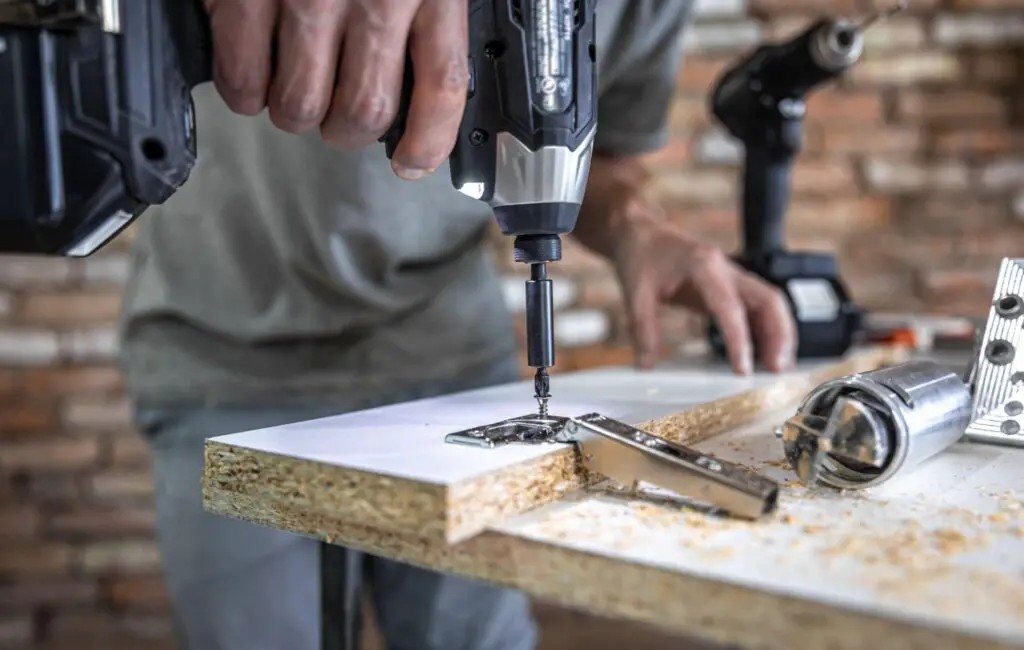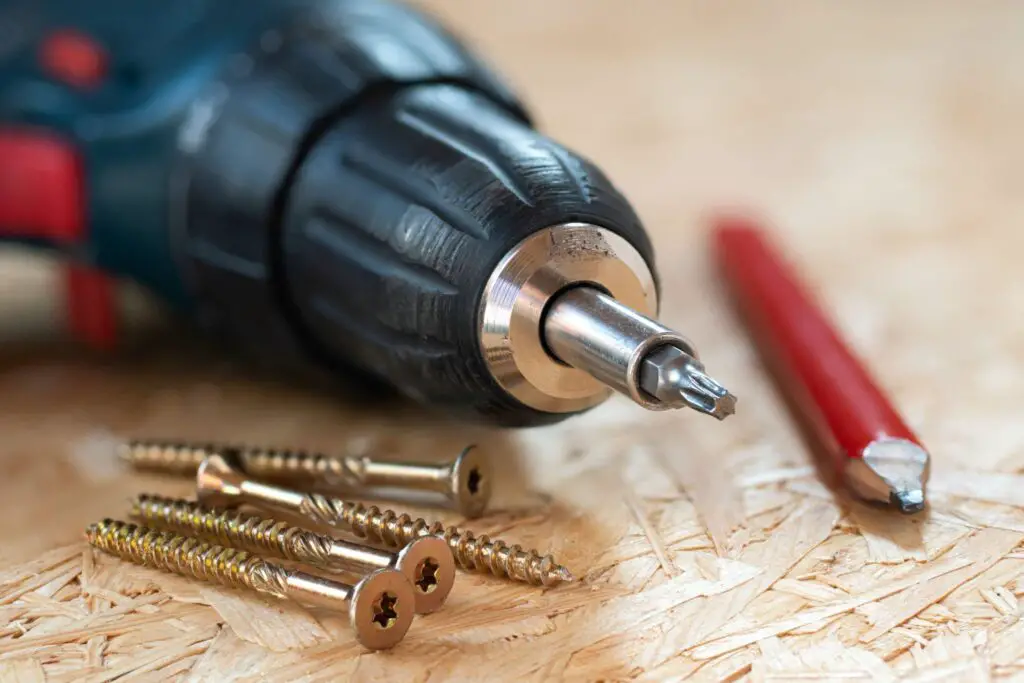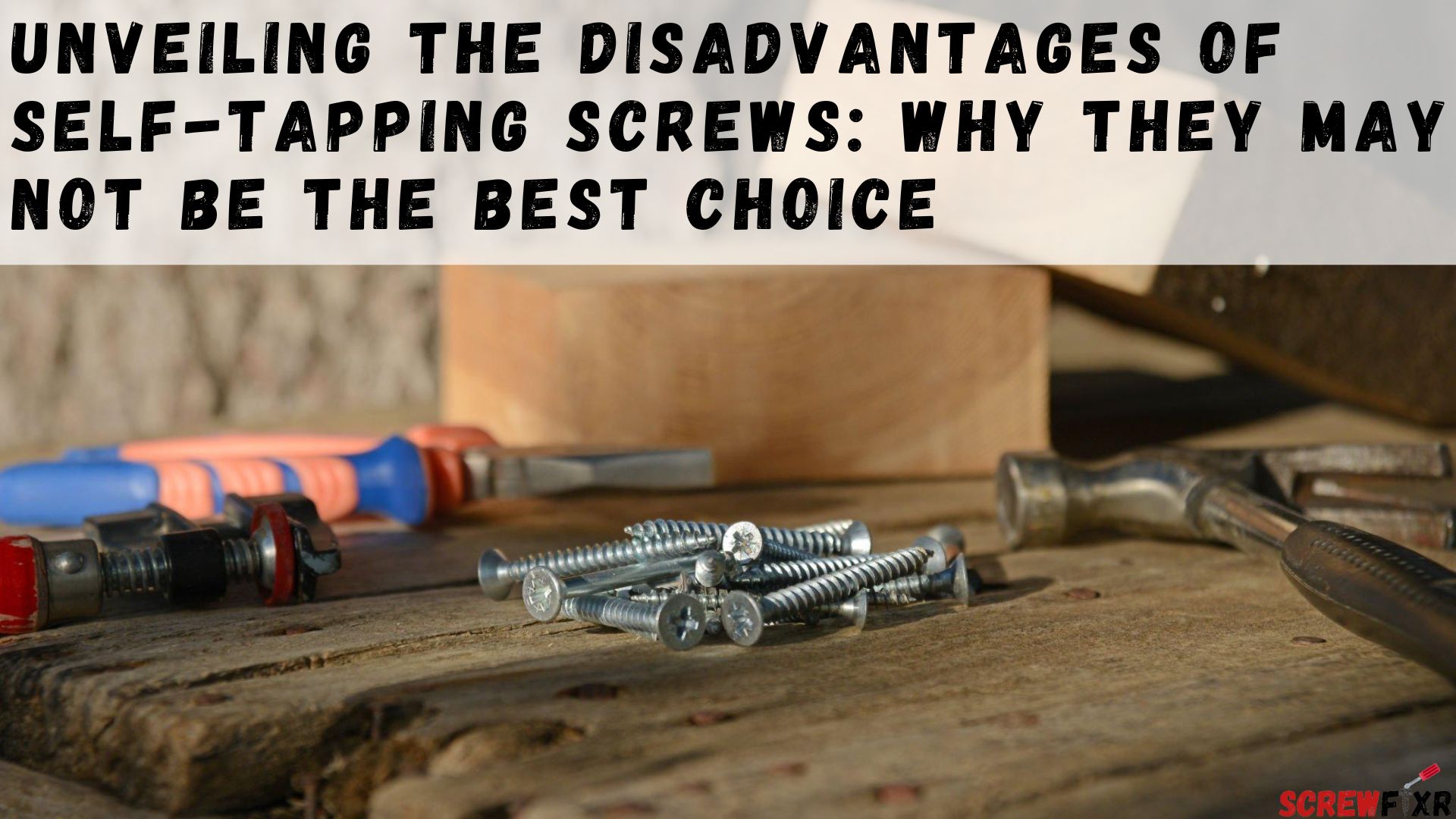Self-tapping screws are a type of fastener that create their own threads as they are driven into materials, commonly used in construction and craft projects for their ease of use and no need for pre-drilled holes. This article discusses the disadvantages of self tapping screws and things related to them such as reduced strength and durability, difficulty in removal, and limited applications, and suggests that they should be considered before being used in a project.
What Are The Disadvantages Of Self Tapping Screws

Self tapping screws have a few disadvantages that should be considered before using them in a project. These drawbacks can range from reduced strength and durability to difficulty in the removal and limited applications.
Disadvantage 1: Reduced Strength And Durability
- One of the main disadvantages is their reduced strength and durability compared to traditional screws. This is due to the fact that self tapping screws are designed to create threads in materials, which can weaken the structure of the screw itself. Also, Those screws are often made from softer metals, such as aluminum or brass, which can also contribute to their reduced strength.
- Evidence of this can be seen in situations where self tapping screws have failed or caused problems. For example, a self tapping screw used to hold a piece of furniture together may come loose over time, causing the piece to become unstable. In a construction project, self tapping screws may not hold up under heavy loads or movement, leading to structural issues.
- The potential consequences of reduced strength and durability are significant. A failure of a self tapping screw can lead to damage to the materials or even injury. It can cause structural issues that can be costly to repair. It’s important to consider these potential consequences before deciding to use those screws in your project in construction projects.
Disadvantage 2: Difficulty In Removal
- Another disadvantage of self tapping screws is their difficulty in removal. The unique design of those screws, which creates threads as they are driven into materials, also makes them difficult to remove. The threads can become stripped or damaged, making it difficult to remove the screw without causing damage to the surrounding materials.
- This difficulty in removal can also lead to the need for specialized tools or techniques. For example, using a screw extractor may be necessary to remove a self tapping screw that has become stripped or damaged. In some cases, this kind of screw may need to be drilled out or cut off, which can cause damage to the surrounding materials.
Read Also: Can WD-40 Remove A Screw
Disadvantage 3: Limited Applications
- Self tapping screws are not suitable for all types of materials and situations. They are not recommended for use in metal or hard materials, as they may not be able to create threads effectively. Self tapping screws are not recommended for use in situations where the screws will be subjected to high stress or vibration, as they may fail under these conditions.
- The limitations mentioned above are, self tapping screws may also be limited in their ability to hold heavy or bulky items. They are also not recommended for use in situations where the screws will be exposed to moisture or harsh weather conditions, as they may rust or corrode over time.
- Using those types of screws in inappropriate situations can have serious consequences. If the screws are not suitable for the materials or conditions, they may fail or cause damage. This can result in the item or structure being unstable or unsafe or can cause damage to the materials. Using these screws in inappropriate situations can also lead to costly repairs or replacements, and may even void any warranties on the item or structure.
- Thus, it’s essential to consider the type of materials and the environmental conditions of the project before choosing the right type of screws. While the screws are a great option for many projects, they may not be the best choice in certain situations. It’s always best to weigh the pros and cons of the different types of screws and choose the best one for the job at hand.
Why self tapping screws May Not Be the Best Choice for some projects

Self-tapping screws may not be the best choice because they can cause damage to the material being screwed into, such as cracking or splitting. They also require a pilot hole to be drilled first, which can be time-consuming and difficult to align. Self-tapping screws may not provide as strong of a hold as other types of fasteners, such as traditional tap and die threads. They also tend to wear out faster, which means they may need to be replaced more frequently.
- Damage to the material being screwed into: It can cause cracking or splitting in the material they are being screwed into.
- Pilot hole requirement: It requires a pilot hole to be drilled first, which can be time-consuming and difficult to align.
- Reduced holding strength: It may not provide as strong of a hold as other types of fasteners, such as traditional tap and die threads.
- Faster wear: It tends to wear out faster than other types of fasteners, which means they may need to be replaced more frequently.
- Limited materials: Those screws are not suitable for some materials like soft materials, brittle materials, and thin materials.
- Limited sizes and strength: These screws are not available in larger sizes and can’t handle heavy loads and high torque.
- Cost: It is generally more expensive than other types of fasteners.
Do you pre-drill holes for self-tapping screws?
Absolutely. but You may not always need to predrill holes for self tapping screws. It actually depends on a couple of factors. Like the material, the screw that will be used, and the type and size of the screws themselves.
It is especially important when working with hardwoods, composites, or other dense materials. Let’s take a closer look at the different types of self tapping screws available. Sharp point self tapping screws, much like drywall screws, have a hardened steel tip that can easily penetrate a 22 or 24-gauge steel stud, and even a 20-gauge steel stud with a little bit of force. These screws have fairly coarse threads that can bite and pull in tightly.
Drill point screws, on the other hand, have a built-in drill bit. Tech 9 and Tech 7 screws can even drill through 1/2-inch steel. These screws may have Phillips driver heads or hexagon bolt heads. Self-threading machine screws, like 12-24 and 1/4-20, have blunt tips and are often used for installing door hardware. These screws have a slot along one edge of the threaded end to discharge bits of metal so they can thread themselves in. But due to the blunt tip, they require predrilled holes (the correct size) to be installed.
Do self-tapping screws rust?
Self tapping screws can be resistant to rust. The rust resistance depends on the material that it is made from, screws that are made from stainless steel are highly resistant to rust and corrosion. Other materials used to make those screws, such as aluminum or brass, are also resistant to rust and corrosion.
Can you remove and reinstall self tapping screws?
Yes, you can remove and reinstall those screws. Self tapping screws are designed to create their own threads as they are screwed into a material, but they can still be removed and reused if needed.
To remove a self tapping screw, simply use a screwdriver to turn the screw counterclockwise until it is completely removed from the material. Depending on the type of material and screw used, you may need to apply a bit of force to remove the screw. Once the screw is removed, you can clean it and the surrounding area for reinstallation. If the screw threads are damaged or worn, it may not be possible to reuse the screw, but in most cases, self tapping screws can be reused multiple times.
Final Words
Self-tapping screws have several disadvantages that should be taken into consideration before using them in a project. The potential consequences of reduced strength and durability, difficulty in the removal, and limited applications can lead to damage of the materials or even injury, costly repairs or replacements, and may make a project unstable or unsafe. It’s important to consider these potential consequences before deciding to use these screws in your project.
Now, have you ever had the frustrating experience of a screw head breaking off while working on a project? If so, you might be curious about the reasons behind this common issue. We’ve got you covered with an informative article explaining why screw heads break off and how to avoid it in the future. Check out – Why do screw heads break off?
You Might Also Like:


